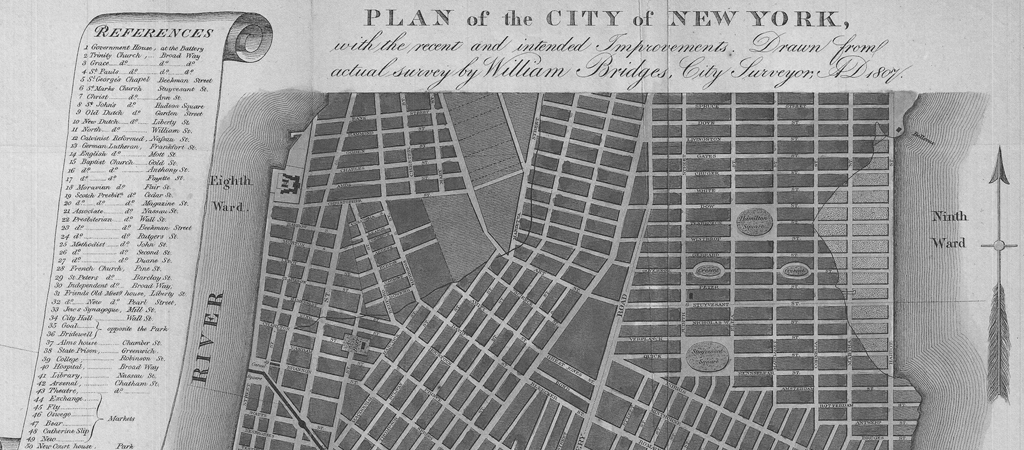Not Giving Allegiance To The Grid
You should see The Cruise. It’s a documentary about Timothy “Speed” Levitch, a completely not normal seeming guy, who’s a double-decker tour bus guide in Manhattan. There’s a great scene where he’s recalling a conversation he had with one of his tourists. He’d been talking to her about “the grid plan,” the layout of avenues and streets in square blocks all over Manhattan. Talking about how the grid plan emanates from a lie and how he’d really like to blow it up and rewrite the streets to be (as he puts it): “much more a self portraiture of our personal struggles rather than some real estate broker’s wet dream from 1807.”
Apparently the tourist is a little taken aback. She says, “I never even thought of that. I can’t even imagine that. Everyone likes the grid plan. How could you not like the grid plan? It’s so functional. Everyone likes the grid plan.”
As he’s recalling this conversation in the film Levitch is really agitated. “Who’s everyone?” he says. And he stops and the camera stops on someone curled up under a blanket in an alley. “Whoever that is under the white comforter cuddled up with 34th street and Broadway existing on the concrete of this city, hungry and disheveled, struggling to crawl their way through existence, what do they think of the grid plan?”
He can’t believe that the tourist has never questioned the grid plan.
“What is this woman thinking?” he says, “We’re forced to walk at these right angles. I mean, doesn’t she find it infuriating? By being so completely allegiant to the grid plan she’s like aligning herself totally with this civilization.”
“I think most noteworthy is this idiom ‘I can’t even imagine altering the grid plan.’ I can’t imagine anything different than this civilization, this lying reality that rules our lives. It’s like saying I can’t imagine standing up on a chair in the middle of the room to change perspective. I can’t imagine changing my mind about anything. Take a right turn, a right turn, a right turn, then there’s a red light. And a green light, And a yellow light.”
He goes on for maybe ten more minutes about it. I mean yeah, the guy’s a little crazy. He rides a double decker bus all over “the grid plan,” all over the streets of Manhattan all day, and yet he refuses to give his allegiance to it. He refuses to believe in it. He may live within the structure, but he’s still not buying it totally and he’s out there to get all the other people riding on the bus to not buy it or believe in it either.
The structures, the grid, the rules of twenty-first century American society are different, obviously, than the structures of first century Palestine. Different enough that it makes it pretty difficult for us to even understand anything in the text at all sometimes.
This story about Jesus and the Canaanite woman, is a weird one that way.
In the Biblical world, honor was a huge thing, an elaborate system that structured society, sort of like social status, or class privilege. Some groups of people had more honor by privilege of birth or lineage than others. But unlike social status in our society, honor wasn’t a ladder you could climb up. Instead there was a limited amount allotted to you and basically you just had to preserve what you had, make sure you didn’t lose any for your group or your clan.
It was what you would call “a limited good society.” There was a finite amount of good in the world, a finite amount of honor allotted to you and your family or group. So you had to be really careful about letting any of it go. There’s no excess to go around. Public conversations were like little games: honor contests with lots of elaborate rules. On-lookers were all gauging how well the contestants were preserving their relative honor. This is one of those public encounters.
This encounter is a little off the grid. The scaffolding is not quite holding. It looks a little not normal, a little crazy. Because women aren’t really even supposed to play the game at all. The onlookers were probably not gauging, but sucking in their breath. “Oh. My. Gosh. Woman. Get back home woman.” She’s really risking losing honor by even being out trying to talk to a strange man. And Jesus, by merely speaking to the woman instead of her male representative, is risking honor loss big time.
When you think of that, and how many times Jesus actually does encounter women in the gospel stories, it’s amazing. Crazy.
And then there’s this whole thing: Matthew calls her a Canaanite woman. That Matthew chooses to call her that is pretty much like a siren going off. Canaanite is sort of an old fashioned term by Matthew’s day, seeing as Canaan hadn’t been around for centuries. It was what Israel used to be called before the Israelites slaughtered the Canaanites and took all their land.
In the book of Deuteronomy, the Israelites get instructions as they are going about conquering the land, to kill all the men when they attack a city, but to keep the women and children and animals for their use. But if it’s a Canaanite city? “You shall save alive nothing that breathes, but you shall utterly destroy them.”
This is not only a woman that Jesus encounters, but the archetypal enemy of his people.
You would not expect this woman to be here asking this man for healing for her daughter, not in a zillion years. Why is she? It’s utterly remarkable crazy wild that the Canaanite woman would want or expect anything at all from the lord of her enemies. It all looks so recklessly inconsiderate of reality. Inconsiderate of normality. In violation of the caution you would expect in the game. A little outside the rules. What about the honor? Isn’t she worried?
Isn’t he worried? She just calls out, “Have mercy on me, Lord, my daughter is severely possessed by a demon. Help. Save my daughter.” The disciples are worried. They’re like, “Hey don’t threaten the honor, man. Get her away.” They’re worried. They’re guarding it, “It’s our bread, man, don’t play around with it.”
But Jesus speaks to her. That’s really something. But he does sort of give her the party line, “I was sent only to the lost sheep of the house of Israel, my people.” Then he asks, “Is it fair to take the children’s bread and throw it to the dogs?” At that point, I’m pretty sure I’d be like, “Well screw you.” Or maybe like, “Oh yeah, what was I thinking. I must have lost my head for a moment. Oh yeah. The limited good. Oh yeah, the grid. Oh yeah, I guess I forgot for a moment how things operate, how the world works. Oh yeah, the right angles. And the right angles, And the squares. And the stoplights. Oh yeah, my enemy. Forget I ever asked. Bye.”
But she’s just not going back there. She’s not giving her allegiance to the grid.
She may be crazy, but she’s just not going to believe in the limitations. She’s not going to turn the corner and obey the stoplight. And she knows Jesus is with her. She says, “I’m not asking for the children’s bread,” as if there isn’t enough to go around, enough for everybody, enough for the pets under the table, “The mere crumbs that fall from that plenteous, lavishly graceful bread will be enough.”
Apparently she’s not buying the “limited good society.” She’s not worried about the scarcity of food, of good, of honor, love, mercy, healing. She may be crazy, but she believes in the unlimited grace of God.
Jesus immediately responds, “Woman, your faith is great.” Jesus and the Canaanite woman seem to have an understanding, a hidden alliance, a pact to resist together the structure imposed by a limited good society, the grid that emanates from lies. A pact to resist the notion that “There’s not enough.” The woman has faith in God, believes that the grace of God can’t be contained.
This story is sandwiched between the two stories of the miraculous feedings of the multitudes. In those stories it seems like there’s just a little bit of food. And the disciples, of course, are worried that there’s a serious scarcity. But as it turns out, over against every apparent possibility, the food is plentiful, lavish, nobody goes hungry.
The crumbs are falling all over and they’re feeding the multitudes.
There’s enough for the Canaanites, unbelievably. Enough for lost sheep, lost goats, gentiles, the lame, Romans even. Enemies, of all varieties. Your enemies, my enemies. There’s enough for the pets under the table. Enough for the dogs: for Flippy and Scruffy and Caesar and Iggy and Fender. And probably the cats too.
However the structures conspire to contain it, the love, grace, mercy of God can’t be contained. Not by the walls of first century Jewish religion or the walls of a sexist society or a limited good society, or the grid plan. The realities of empire can’t contain it. Our theology, your brain, even your imagination can’t contain it. The mercy and the grace and the love, the food, is not finite. It’s infinite, uncontainable, bigger than anything.
Damn, that’s hard to believe. This woman seems to believe it. At least in this moment.
So. You have to ride the bus, play the games, make money, buy insurance, watch TV. Okay. But you don’t have to give your allegiance to it. You don’t have to believe in it. It makes a difference where you put your faith. It might confuse and disrupt traffic flow if you don’t give your allegiance to the grid. It might muck up the clarity that is after all, a lie.
It might throw a kink into the system if you believe in God.
—Debbie Blue, from her book Sensual Orthodoxy



Thank you for sharing works that I would never even think of picking up off the shelf!
Haha! I know what you mean – the title of the book wouldn’t pull me in either. But I had already run across Debbie Blue in another work and was fascinated with her handling of Scripture. I think the “sensual” description has more to do with the senses… here’s a description from the back cover of the book:
Debbie Blue approaches Scripture like a farm wife handles a chicken, carefully but not delicately, thoroughly but not exactly cautiously. In “Sensual Orthodoxy” she handles Gospel passages as tangled questions about a God who gets a body. She says, “Though religion surprisingly often has an anti-sensual, abstracting sort of tendency, the story of Christ goes in the opposite direction. God becomes incarnate, physical, in the world.”
Really enjoyed her unorthodox route to the nugget, and the nugget itself: “However the structures conspire to contain it, the love, grace, mercy of God can’t be contained. Not by the walls of first century Jewish religion or the walls of a sexist society or a limited good society, or the grid plan. The realities of empire can’t contain it. Our theology, your brain, even your imagination can’t contain it. The mercy and the grace and the love, the food, is not finite. It’s infinite, uncontainable, bigger than anything.” Thanks for plowing new ground for us!